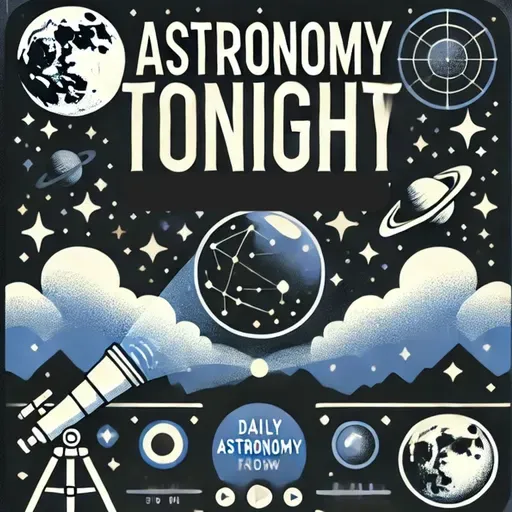
About
This is your Astronomy Tonight podcast.
On August 31st, 1932, the astronomy world was abuzz with excitement as a groundbreaking discovery was made by German astronomer Karl Reinmuth at the Heidelberg Observatory. On this day, Reinmuth spotted a small, fast-moving object in the night sky that would later be confirmed as asteroid 1862 Apollo, the very first Near-Earth Asteroid (NEA) ever discovered!
Now, you might be thinking, "Big deal, it's just another space rock," but oh boy, this little celestial speedster changed the game entirely! Apollo became the namesake for an entire class of asteroids that cross Earth's orbit, aptly named the Apollo asteroids. These cosmic daredevils swing by our planet closer than we'd sometimes like, giving astronomers both thrills and chills.
Imagine being Reinmuth that night, peering through his telescope and suddenly realizing, "Holy schnitzel! That's no ordinary dot in the sky!" His discovery opened up a whole new field of study in astronomy and planetary defense. It's like finding out there's a bowling alley in the sky, and Earth is one of the pins!
Since then, we've identified thousands of Near-Earth Asteroids, but Apollo will always hold a special place in astronomers' hearts as the trailblazer that made us look a little closer at our celestial neighborhood.
So, the next time you're stargazing on August 31st, give a little nod to old 1862 Apollo. It might just be out there, zooming by and winking at its adoring fans on Earth.
If you enjoyed this cosmic tidbit, don't forget to subscribe to the Astronomy Tonight podcast for more out-of-this-world stories. And if you're hungry for more fascinating facts and fun content, check out QuietPlease.AI. Thanks for listening to another Quiet Please Production!
On August 31st, 1932, the astronomy world was abuzz with excitement as a groundbreaking discovery was made by German astronomer Karl Reinmuth at the Heidelberg Observatory. On this day, Reinmuth spotted a small, fast-moving object in the night sky that would later be confirmed as asteroid 1862 Apollo, the very first Near-Earth Asteroid (NEA) ever discovered!
Now, you might be thinking, "Big deal, it's just another space rock," but oh boy, this little celestial speedster changed the game entirely! Apollo became the namesake for an entire class of asteroids that cross Earth's orbit, aptly named the Apollo asteroids. These cosmic daredevils swing by our planet closer than we'd sometimes like, giving astronomers both thrills and chills.
Imagine being Reinmuth that night, peering through his telescope and suddenly realizing, "Holy schnitzel! That's no ordinary dot in the sky!" His discovery opened up a whole new field of study in astronomy and planetary defense. It's like finding out there's a bowling alley in the sky, and Earth is one of the pins!
Since then, we've identified thousands of Near-Earth Asteroids, but Apollo will always hold a special place in astronomers' hearts as the trailblazer that made us look a little closer at our celestial neighborhood.
So, the next time you're stargazing on August 31st, give a little nod to old 1862 Apollo. It might just be out there, zooming by and winking at its adoring fans on Earth.
If you enjoyed this cosmic tidbit, don't forget to subscribe to the Astronomy Tonight podcast for more out-of-this-world stories. And if you're hungry for more fascinating facts and fun content, check out QuietPlease.AI. Thanks for listening to another Quiet Please Production!